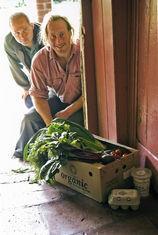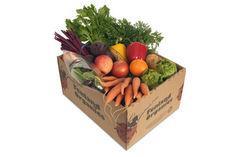

Organic box schemes could become the latest victims of the supermarket wars, as Tesco and Sainsbury’s expand their offers with organic vegetable deliveries.
Seeking to corner a greater share of the expanding organic market, both retailers will trial box schemes in the next two months.
Sainsbury’s kicks off its activity with a pilot targeting 500,000 customers in the East Midlands and East Anglia at the end of August, while Tesco will launch its scheme in south London in early September.
The venture forms part of a drive by the supermarkets to prioritise green practices, by sourcing more local and regional produce.
Tesco said it would begin by sourcing fruit, veg and salad products for the boxes from four principal East Anglian growers.
The boxes will be sold under Tesco supplier G’s Marketing’s own brand Fenland Organics and distributed from the retailer’s Croydon store, dedicated to handling online orders.
In a bid to connect consumers with the provenance of their food, Tesco will also include a newsletter with the produce orders, detailing one of the farmers supplying the scheme.
The retailer expects to sell some 600 boxes a week initially, each containing 10 products - eight salad or veg items and two pieces of fruit.
Sainsbury’s will begin offering eight seasonal salad items distributed from its Cambridgeshire hub but the retailer admitted it would source nationally if necessary to supplement local procurement.
NGO Friends of the Earth has warned this move could threaten the livelihoods of the smaller, local organic box schemes in operation, especially, it said, as retailers are likely to undercut competition on price.
However, Tesco’s boxes will retail at £11 and Sainsbury’s has said its boxes will come in at under £15 - which are both in line with other schemes’ pricing.
Guy Watson, managing director of Devon-based Riverford Organics, which packs in the region of 44,000 organic veg boxes a week, told FPJ he is not concerned by the retailers’ decision.
He said he is highly sceptical of their ability to source a sufficient mix of 100 per cent UK produce year-round and believes his customer base will be equally dubious.
He said: “I see it as an act of desperation. Fifty-eight per cent of consumers said they would prefer not to shop at supermarkets. They [retailers] obviously recognise they are not meeting the needs of all their customers but the logistics of running a box scheme are very different to running a supermarket.”
Rod Hall of Rod and Ben’s, a smaller box scheme company, also in Devon, agreed, adding: “Box schemes are about more than buying food. We’ve got a particular style of production and people like to involve themselves - to come and visit the farm and see how their carrots are growing. Of course, supermarkets can do it cheaper, but will people have the same experience?
“If [the supermarkets] are clever and get growers to co-operate and get food that is local and ethical, that would be great.
“But they have got to realise they have to look after producers - it has to be a win-win relationship.”



